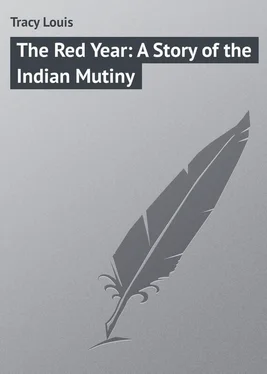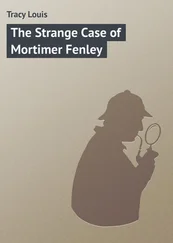Louis Tracy - The Red Year - A Story of the Indian Mutiny
Здесь есть возможность читать онлайн «Louis Tracy - The Red Year - A Story of the Indian Mutiny» — ознакомительный отрывок электронной книги совершенно бесплатно, а после прочтения отрывка купить полную версию. В некоторых случаях можно слушать аудио, скачать через торрент в формате fb2 и присутствует краткое содержание. Жанр: foreign_prose, на английском языке. Описание произведения, (предисловие) а так же отзывы посетителей доступны на портале библиотеки ЛибКат.
- Название:The Red Year: A Story of the Indian Mutiny
- Автор:
- Жанр:
- Год:неизвестен
- ISBN:нет данных
- Рейтинг книги:5 / 5. Голосов: 1
-
Избранное:Добавить в избранное
- Отзывы:
-
Ваша оценка:
- 100
- 1
- 2
- 3
- 4
- 5
The Red Year: A Story of the Indian Mutiny: краткое содержание, описание и аннотация
Предлагаем к чтению аннотацию, описание, краткое содержание или предисловие (зависит от того, что написал сам автор книги «The Red Year: A Story of the Indian Mutiny»). Если вы не нашли необходимую информацию о книге — напишите в комментариях, мы постараемся отыскать её.
The Red Year: A Story of the Indian Mutiny — читать онлайн ознакомительный отрывок
Ниже представлен текст книги, разбитый по страницам. Система сохранения места последней прочитанной страницы, позволяет с удобством читать онлайн бесплатно книгу «The Red Year: A Story of the Indian Mutiny», без необходимости каждый раз заново искать на чём Вы остановились. Поставьте закладку, и сможете в любой момент перейти на страницу, на которой закончили чтение.
Интервал:
Закладка:
“You want Nicholson here,” said he, laughing with grim mirth. “By all the gods, he would horse-whip your general into the saddle.”
“Hewitt is an old man, and cautious, therefore,” explained Frank, in loyal defense of his chief. “Perhaps he deems it right to await the orders you are now bringing.”
“An old man! You mean an old woman, perhaps? I come from one. I had to go on my knees almost before I could persuade Anson to let me start.”
“Well, you must admit that you have made a daring and lucky ride?”
“Nonsense! Why is one a soldier! I would cross the infernal regions if the need arose. If I had been in Meerut on that Sunday evening, no general that ever lived could have kept me out of Delhi before daybreak. The way to stop this mutiny was to capture that doddering old king and hold him as a hostage, and twenty determined men could have done it easily in the confusion.”
That was William Hodson’s way. Men who met him began by disliking his hectoring, supercilious bearing. They soon learnt to forget his gruffness and think only of his gallantry and good-comradeship.
At any rate his stirring advice and the dispatches he brought roused the military authorities at Meerut into activity. Carrying with him a letter to the Commander-in-Chief he quitted Meerut again that night, and dismounted outside Anson’s tent at Kurnaul at dawn on the second day!
On the 27th, Archdale Wilson led the garrison towards the rendezvous fixed on by the force hurriedly collected in the Punjab for the relief of Delhi. On the afternoon of the 30th, cavalry vedettes reported the presence of a strong body of mutineers on the right bank of the river Hindun, near the village of Ghazi-ud-din Nuggur and at a place where a high ridge commanded an iron suspension bridge. It was found afterwards that the rebels meant to fight the two British forces in detail before they could effect a junction. The generalship of the idea was good, but the sepoys did not count on the pent-up wrath of the British soldiers, who were burning to avenge their murdered countrymen and dishonored countrywomen, for it was now becoming known that many a fair English lady had met a fate worse than death ere sword or bullet stilled her anguish.
A company of the 60th Rifles dashed forward to seize the bridge, Lieutenant Light and his men took up the enemy’s challenge with their heavy eighteen-pounders, and Colonel Mackenzie and Major Tombs, at the head of two batteries of horse artillery, crossed the river and turned the left flank of the sepoy force. Then the Rifles extended and charged, the mutineers yielded, and Colonel Custance with his dragoons sabered them mercilessly for some miles.
Next morning, Whit-Sunday, while the chaplains were conducting the burial service over those who had fallen, the mutineers came out of Delhi again. A severe action began instantly. Tombs had two horses shot under him, and thirteen out of fifty men in his battery were killed or wounded. But the issue was never in doubt. After three hours’ hard fighting the rebels broke and fled. So those men in Meerut could give a good account of themselves when permitted! Actually, they won the two first battles of the campaign.
Exhausted by two days’ strenuous warfare in the burning sun, they could not take up the pursuit. The men were resting on the field when a battalion of Ghoorkahs, the little fighting men of Nepaul, arrived under the command of Colonel Reid. They had marched by way of Bulandshahr, and Malcolm heard to his dismay that the native infantry detachment stationed there, aided by the whole population of the district, had committed the wildest excesses.
Yet Winifred and her uncle had passed through that town on the road to Cawnpore. Aligarh, too, was in flames, said Reid, and there was no communication open with Agra, the seat of Government for the North-West Provinces. There was a bare possibility that the Maynes might have reached Agra, or that Nana Sahib had protected them for his own sake. Such slender hopes brought no comfort. Black despair sat in Malcolm’s heart until the Brigadier sent for him and ordered him to take charge of the guard that would escort the records and treasure from Meerut to Agra. He hailed this dangerous mission with gloomy joy. Love had no place in a soldier’s life, he told himself. Henceforth he must remember Winifred only when his sword was at the throat of some wretched mutineer appealing for mercy.
He went to his tent to supervise the packing of his few belongings. His bearer, 5 5 A personal servant, often valet and waiter combined.
a Punjabi Mohammedan, who cursed the sepoys fluently for disturbing the country during the hot weather, handed him a note which had been brought by a camp follower.
It was written in Persi-Arabic script, a sort of Arabic shorthand that demands the exercise of time and patience ere it can be deciphered by one not thoroughly acquainted with it. Thinking it was a request for employment which he could not offer, Malcolm stuffed it carelessly into a pocket. He rode to Meerut, placed himself at the head of the 8th Irregular Cavalry, a detachment whose extraordinary fidelity has already been narrated, and set forth next morning with his train of bullock carts and their escort.
He called the first halt in the village where he had parted from Winifred. The headman professed himself unable to give any information, but the application of a stirrup leather to his bare back while his wrists were tied to a cart wheel soon loosened his tongue.
The king’s hunting lodge was empty, he whined; and the Roshinara Begum had gone to Delhi. Nana Sahib’s cavalcade went south soon after the Begum’s departure, and a moullah had told him, the headman, that the Nana had hastened through Aligarh on his way to Cawnpore, not turning aside to visit Agra, which was fifty miles down the Bombay branch of the Grand Trunk Road.
Malcolm drew a negative comfort from the moullah’s tale. That night he encamped near a fair-sized village which was ominously denuded of men. Approaching a native hut to ask for a piece of charcoal wherewith to light a cigar, he happened to look inside. To his very great surprise he saw, standing in a corner, a complete suit of European armor, made of tin, it is true, but a sufficiently bewildering “find” in a Goojer hovel.
A woman came running from a neighbor’s house. While giving him the charcoal she hastily closed the rude door. She pretended not to understand him when he sought an explanation of the armor, whereupon he seized her, and led her, shrieking, among his own men. The commotion brought other villagers on the scene, as he guessed it would. A few fierce threats, backed by a liberal display of naked steel, quickly evoked the curious fact that nearly all the able-bodied inhabitants “had gone to see the sahib-log 6 6 A generic term for Europeans.
dance.”
Even Malcolm’s native troops were puzzled by this story, but a further string of terrifying words and more saber flourishing led to a direct statement that the white people who were to “dance” had been captured near the village quite a week earlier and imprisoned in a ruined tomb about a mile from the road. It was risky work to leave the valuable convoy for an instant, but Malcolm felt that he must probe this mystery. Taking half a dozen men with him, and compelling the woman to act as guide, he went to the tomb in the dark.
The building, a mosque-like structure of considerable size, was situated in the midst of a grove of mango trees. A clear space in front of the tomb was lighted with oil lamps and bonfires. It was packed with uproarious natives, and Malcolm’s astonished gaze rested on three European acrobats doing some feat of balancing. A clown was cracking jokes in French, some nuns were singing dolefully, and a trio of girls, wearing the conventional gauze and spangles of circus riders, were standing near a couple of piebald ponies.
Читать дальшеИнтервал:
Закладка:
Похожие книги на «The Red Year: A Story of the Indian Mutiny»
Представляем Вашему вниманию похожие книги на «The Red Year: A Story of the Indian Mutiny» списком для выбора. Мы отобрали схожую по названию и смыслу литературу в надежде предоставить читателям больше вариантов отыскать новые, интересные, ещё непрочитанные произведения.
Обсуждение, отзывы о книге «The Red Year: A Story of the Indian Mutiny» и просто собственные мнения читателей. Оставьте ваши комментарии, напишите, что Вы думаете о произведении, его смысле или главных героях. Укажите что конкретно понравилось, а что нет, и почему Вы так считаете.












